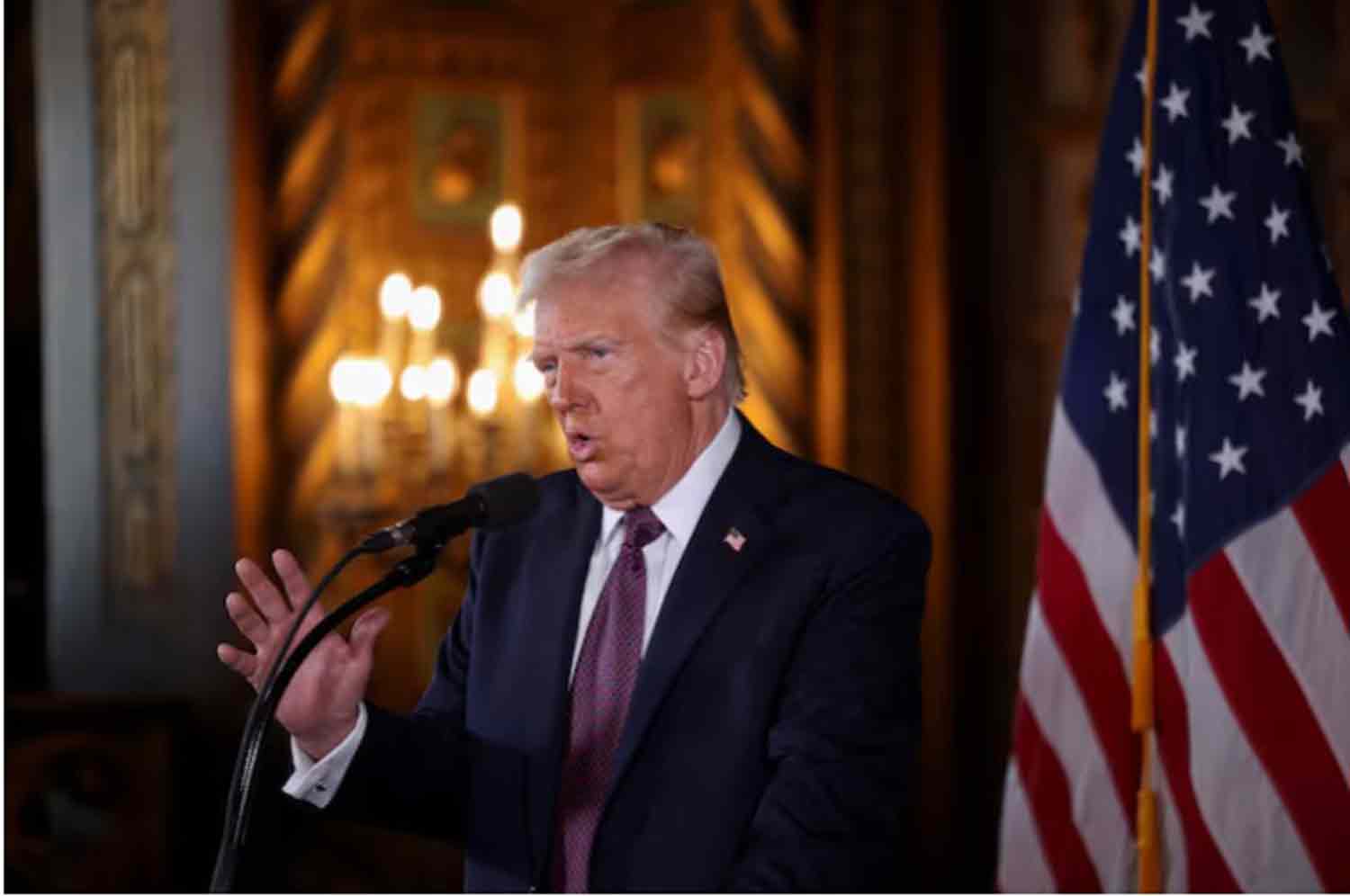US President Donald Trump’s suggestion to “clean out” the Gaza Strip by relocating over a million Palestinians to neighboring nations has faced intense backlash, with critics labeling it as ethnic cleansing and cautioning against potential regional instability.
On Saturday, Trump expressed his desire for Jordan and Egypt to accommodate Gazans displaced by Israel’s ongoing conflict in the region. “You’re talking about a million and a half people, and we just clean out that whole thing,” he stated to reporters on Air Force One.
He indicated that the relocation could be either “temporary” or “long-term.” Both Jordan and Egypt promptly dismissed the proposal.
Should this plan be implemented, it would represent a significant departure from the Biden administration’s position that Gaza should remain populated and could indicate a shift from the traditional US viewpoint that Gaza is integral to a future Palestinian state. Additionally, it would align the Trump administration with Israel’s most extreme right-wing factions, who advocate for the removal of Palestinians to facilitate Jewish settlement.
Trump’s proposal has found support among radical Israeli politicians, including Finance Minister Bezalel Smotrich, who controversially asserted that “there is no such thing as a Palestinian people,” and former National Security Minister Itamar Ben Gvir, who has a history of supporting terrorism and inciting anti-Arab sentiments.
Palestinian leaders condemned the proposal as a strategy for the ethnic cleansing of Gazans from their homeland.
In the United States, even Senator Lindsey Graham, a staunch supporter of Israel in Congress, expressed skepticism about the practicality of the idea during a CNN interview. “I don’t know what he’s talking about,” Graham remarked, referring to Trump.
Experts caution that, in addition to the ethical and legal implications, a significant influx of refugees into neighboring Arab nations could lead to instability and represent a serious threat to their existence. They argue that acquiescing to Trump’s proposal would incite widespread public outrage, a risk that these governments cannot afford to take.
‘A second Palestinian Nakba’
Timothy Kaldas, deputy director of the Tahrir Institute for Middle East Policy in Washington, DC, stated to CNN, “If they were to… accept being participants in and hosting Palestinians in an ethnic cleansing, that would undoubtedly be infuriating and genuinely destabilizing for both countries.”
According to Hasan Alhasan, a senior fellow for Middle East policy at the International Institute for Strategic Studies in Bahrain, both the Egyptian and Jordanian administrations would face significant domestic backlash if perceived as complicit in a second Palestinian Nakba. This term refers to the events of 1948, when approximately 700,000 Palestinians either fled or were forcibly removed from their homes during the establishment of Israel.
Israel has prohibited these individuals and their descendants from returning, resulting in millions of refugees residing in neighboring countries without citizenship or viable options for permanent resettlement.
Alhasan further noted, “Given that the Palestinians of Gaza are highly unlikely to leave voluntarily, a forced displacement towards Egypt or Jordan would pose a variety of existential threats to these two countries.”
For Jordan, which is already home to millions of Palestinians, a demographic shift could jeopardize the Hashemite monarchy’s grip on power. He further noted that financially, both Egypt and Jordan lack the capacity to accommodate millions of additional refugees.
Egypt and Jordan are among the United States’ closest allies in the Middle East and have been significant recipients of U.S. aid, aligning their regional policies with American interests for decades. They were the first Arab nations to establish peace treaties with Israel and have maintained amicable relations, including security cooperation, despite considerable public opposition.
Jane Kinninmont, a conflict expert at the European Leadership Network and co-host of the Disorder podcast, pointed out that over time, the influence of Jordan and Egypt in Washington, D.C., has been eclipsed by Gulf Arab states like Saudi Arabia and the United Arab Emirates. She emphasized that it remains to be seen how far these countries will go in conveying to Washington that mass displacement will not resolve the conflict.
“It is crucial for regional nations to highlight that the refugee crisis is a key factor in the ongoing conflict, and creating more Palestinian refugees will not provide a solution. This issue is central to the conflict,” Kinninmont stated.
Security concerns
On Sunday, both Egypt and Jordan reiterated their opposition to the deportation or resettlement of Palestinians.
“Jordan is for Jordanians, and Palestine is for Palestinians,” stated Jordanian Foreign Minister Ayman Safadi during a news conference in Amman on Sunday. “Our stance against deportation is firm and unwavering.”
Egypt’s foreign ministry has expressed its opposition to “the deportation or encouragement of the transfer or removal of Palestinians from their land.”
During the ongoing conflict, both Jordan and Egypt have dismissed internal pressures to cut ties with Israel, with Egypt taking on a significant role as a mediator between Israel and Hamas.
In October 2023, demonstrations took place in both nations in solidarity with Palestinians in Gaza, reflecting widespread dissatisfaction with their governments’ collaboration with Israel in light of the severe humanitarian impact of the conflict.
Kaldas from the Tahrir Institute noted that permitting a transfer of the Palestinian population would be more detrimental for both countries than forgoing the American aid they currently depend on.
Egypt and Jordan already accommodate a considerable number of refugees.
As of January, the UNHCR reported that Egypt had 877,000 registered refugees and asylum-seekers. In May, the Palestinian ambassador in Cairo, Diab al-Louh, indicated that approximately 100,000 Gazans had entered Egypt since the onset of the war, as reported by Reuters.
In Jordan, over 2.39 million Palestinian refugees are registered with UNRWA, the United Nations agency dedicated to Palestinian refugees.
Additionally, both nations may face security risks if their territories are used as launch points for attacks on Israel, according to Alhasan. This situation could further jeopardize their peace agreements with Israel.
“By attempting to depopulate Gaza of its Palestinian residents, Trump… is catering to the extreme right-wing factions in Israel,” Alhasan stated.
He added, “Ironically, if Trump’s proposal were to be implemented, it would ultimately be counterproductive.” Destabilizing Egypt and Jordan would likely empower Islamist political groups, particularly the Muslim Brotherhood, which would be “far less amenable to the US and more aligned with Hamas.”
Discover more from Defence Talks | Defense News Hub, Military Updates, Security Insights
Subscribe to get the latest posts sent to your email.





